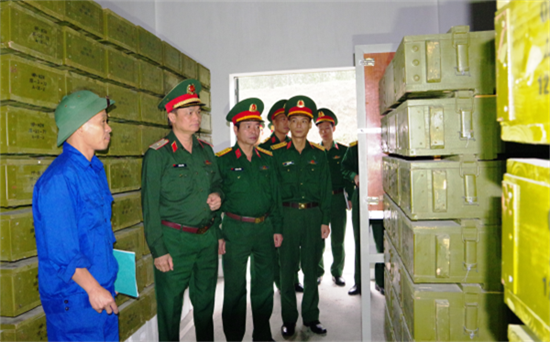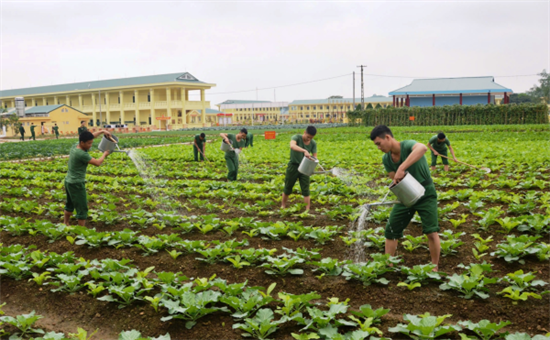Fully aware of its functions and assigned tasks, Military Region 1’s Logistics - Technical Sector has unceasingly renewed and improved its task performance to opportunely provide logistics - technical support for the Military Region’s armed forces to successfully accomplish all missions in the new situation.
Grasping the guidelines and policies by the Central Military Commission and the Ministry of National Defence on merging and re-organising all-level logistics - technical offices, Military Region 1’s Party Committee and Command have adopted many practical, effective measures for re-organising and consolidating logistics - technical forces from grass-roots to military region levels, while comprehensively performing all pieces of work to prevent the streamlining process from impacting on logistics - technical support.
 |
| The Military Region Command inspects Brigade 210’s ammo depot |
With great political resolve, unity, and consensus, in 2024 and the first months of 2025, the Military Region’s Logistics - Technical Sector provided sufficient, timely logistics - technical support for regular and irregular tasks. Targets and tasks of logistics - technical support were fulfilled or exceeded with the increasingly improved quality. Animal/crop husbandry was stepped up and had new developments; troops’ life was unceasingly bettered. Besides, the Sector accomplished all plans of weapon synchronisation, repair, and maintenance for units, maintaining the technical coefficients of weapons and equipment for combat readiness and search and rescue (Kbđ, Kt = 1) as well as for training and routine tasks (Kbđ, Kt = 0.98). Logistics - technical potentialities and postures within the Military Region were consolidated. Those good results have greatly contributed to raising the Military Region’s synergy and combat power.
In the upcoming time, the Military Region’s tasks will continue to witness developments, such as merger of several provincial-level military commands, end of operation of district-level military commands, and establishment of regional defence commands. Consequently, the Logistics - Technical Sector will be faced with many new issues on command and staff work, organisational structure consolidation, development of postures and potentialities, and support work. To deal with those above-mentioned issues, the Sector will continue taking synchronised measures to raise the quality and effectiveness of logistics - technical work, with a focus on the following.
First, giving sound advice to all-level party committees and commands on logistics - technical work. All-level logistics - technical offices, especially the Military Region’s Logistics - Technical Department will grasp higher echelons’ resolutions and directives on logistics - technical work and monitor situational developments to give advice on raising the quality of logistics - technical work for military and defence tasks. Emphasis will be placed on recommending adjustments in logistics - technical forces and the planning and building of logistics - technical postures within military region defence and defensive zones in accordance with the re-organisation of local military agencies and changes in provincial-level administrative boundaries. The Logistics - Technical Sector will give advice to the Military Region and units on strengthening all-level party committees and commands’ leadership and direction over logistics - technical work, heightening all-level commands’ responsibility, encouraging specialised agencies’ core role, and mobilising all forces in realising goals and targets of logistics - technical support. It will continue giving advice, direction, and guidance to units on stepping up the emulation movement entitled “Military Logistics Sector follows Uncle Ho’s teachings”, the Campaign on “managing and using weapons and technical equipment effectively, sustainably, safely, economically and ensuring traffic safety”, and other relevant ones in order to create synergy for well performing logistics - technical support work.
Second, providing sufficient, timely logistics - technical support for tasks, meeting the requirements of making the Military Region’s armed forces “adept, compact, strong”. Adhering to units’ training and combat readiness realities and the Military Region’s tasks, the Logistics - Technical Sector will continue performing all pieces of support work. Regarding logistics - technical support for combat readiness and contingency tasks, emphasis will be placed on researching, adjusting, and supplementing logistics - technical documents under regulations, giving advice to units on logistics - technical reserves, maintaining forces, means, and facilities to opportunely respond to natural disasters and carry out search and rescue operations. When two-tier local government model operates and several provinces within the Military Region are merged with one another, local logistics - technical agencies will concentrate on advising local party committees and authorities to raise the effectiveness of logistics - technical support within defensive zones and build logistics - technical postures in line with all-people national defence posture and local socio-economic development plans.
 |
| Crop husbandry by soldiers of Division 346 |
With reference to regular logistics - technical work, consideration will be given to renewing methods of logistics support towards the decentralisation of authority to units, reducing intermediate steps, and increasing the quality of input products. Great value will be attached to developing models of animal/crop husbandry relevant to each group of units and each area, renewing processing activities, and ensuring the safety and quality of food. Due attention will be paid to managing barracks and national defence land of merged or dissolved units, executing projects to construct and upgrade housing and messes, particularly the projects to build barracks of Regiment 2, Division 3, and Air Defence Brigade 210, the construction project within National Military Training Centre Region 1, and the projects on installing oil stoves and electric stoves (replacing mechanical steam stoves) and clothing drying stations at platoon level, with a view to improving troops’ life. As for technical work, great weight will be added to maintaining coordination and providing guidance for offices and units on ensuring sufficient, synchronised technical equipment for their tasks. Emphasis will be placed on constructing and upgrading depots, workshops, and technical zones, well conducting the work of equipment maintenance and repair. At the same time, direction and guidance on stocktaking and handover of weapons and technical equipment will be provided for merged or dissolved units.
Third, continuing to consolidate logistics - technical forces’ organisational structure, building a pool of “both red and expert” logistics - technical cadres. Based on the results of adjustments in logistics - technical forces and the development of tasks, in the upcoming time, the Military Region’s Logistics - Technical Department will continue to give advice on streamlining the structure of all-level logistics - technical offices and building a corps of “both red and expert” cadres and employees capable of their task requirements in the long term and short term. Adhering to the lines on merging several provincial military commands, dissolving district-level military commands, and establishing regional defence commands, the Logistics - Technical Department will give advice to the Military Region’s Party Committee and Command on projects to deploy and use logistics - technical cadres and employees properly in order to promote their forte and guarantee inheritance and development. At the same time, it will proactively grasp and settle ideological issues, and ensure sufficient policies and entitlements for redundant staff members. A part from the streamlining of their structure, offices and units will strictly maintain specialised training, refresher courses, and contests, with a focus on how to use oil stoves and electric stoves, skills in animal/crop husbandry and food processing, repairing new-generation vehicles, and driving vehicles on military terrains so as to improve all-level logistics - technical staff members’ competence. Besides, due regard will be paid to fostering a sense of responsibility, determination to excellently fulfil all assigned tasks, and dedication to serving troops among logistics - technical cadres and employees.
Fourth, enhancing scientific research and applying technology and digital transformation in logistics - technical work. This measure plays an important role in raising the quality of logistics - technical work in the new situation. Therefore, the Logistics - Technical Sector will concentrate on researching and applying scientific - technological advances and digital transformation to performing its specialised tasks. In the medium term, it will advise units to step up the “Digital Literacy” movement, equip their staff members with basic knowledge of digital skills, information safety, and cyber security, actively apply modern technologies, initiatives, and technical innovations in maintenance, storage, inspection, and quality control of weapons and technical equipment. Significance will be attached to applying science to taking care of troop health, preventing and combating epidemics, modernising messes, and developing animal/crop husbandry, with the aim of improving troops’ life. At the same time, digital transformation will be applied in the whole process of performing logistics - technical work to meet the task requirements in the new situation.
Promoting the spirit of “innovation, creativity, self-reliance, self-strengthening”, cadres, employees, and soldiers of Military Region 1’s Logistics - Technical Sector will continue striving to excellently fulfil logistics - technical work to contribute to making the Military Region’s armed forces “adept, compact, strong”, and capable of protecting the Socialist Vietnamese Fatherland.
Sr. Col. TRAN HUY TUONG
Director of the Military Region’s Logistics - Technical Department